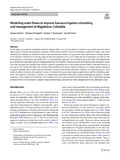JavaScript is disabled for your browser. Some features of this site may not work without it.
| dc.contributor.author | Zubelzu, Sergio | |
| dc.contributor.author | Panigrahi, Niranjan | |
| dc.contributor.author | Thompson, Andrew J. | |
| dc.contributor.author | Knox, Jerry W. | |
| dc.date.accessioned | 2022-09-29T09:59:26Z | |
| dc.date.available | 2022-09-29T09:59:26Z | |
| dc.date.issued | 2022-08-25 | |
| dc.identifier.citation | Zubelzu S, Panigrahi N, Thompson AJ, Knox JW. (2023) Modelling water fluxes to improve banana irrigation scheduling and management in Magdalena, Colombia, Irrigation Science, Volume 41, Issue 1, January 2023, pp. 69–79 | en_UK |
| dc.identifier.issn | 0342-7188 | |
| dc.identifier.uri | https://doi.org/10.1007/s00271-022-00818-7 | |
| dc.identifier.uri | https://dspace.lib.cranfield.ac.uk/handle/1826/18490 | |
| dc.description.abstract | In this paper, an irrigation scheduling model for banana (Musa sp.) was developed to simulate crop growth and water fluxes under typical commercial plantation conditions. Whilst generic models exist for scheduling irrigation for many crops, their suitability for bananas are limited because of the asynchronous nature of crop growth. Individual fields on banana plantations typically contain trees at varying stages in their development cycle, so it is important for scheduling to account for this heterogeneity in simulating crop production. A crop modelling approach was developed using field data from Magdalena, an economically important region of banana production in Colombia. Following model development and calibration, irrigation water demand was estimated and weekly irrigation scheduling advice then transmitted by SMS to individual farmers in the region. The model also takes into account farmer feedback on actual irrigation practices to compare against estimated irrigation demands and to train model performance. Despite good model calibration, analysis of irrigation practices from farmer feedback showed only moderate to poor correlation between actual irrigation applications and the scheduling guidance. This implies a reluctance of farmers to change long-established traditional irrigation management practices, despite awareness of the impacts of systematic over-irrigation on yields and increased nutrient leaching risks. Significant ongoing research efforts will be needed to support improved knowledge and practical water management for key plantation crops. | en_UK |
| dc.description.sponsorship | Innovate UK: TS/S011986/1. | en_UK |
| dc.language.iso | en | en_UK |
| dc.publisher | Springer | en_UK |
| dc.rights | Attribution 4.0 International | * |
| dc.rights.uri | http://creativecommons.org/licenses/by/4.0/ | * |
| dc.title | Modelling water fluxes to improve banana irrigation scheduling and management in Magdalena, Colombia | en_UK |
| dc.type | Article | en_UK |
| dc.identifier.eissn | 1432-1319 |
Files in this item
The following license files are associated with this item:
This item appears in the following Collection(s)
-
Staff publications (SWEE) [2828]

